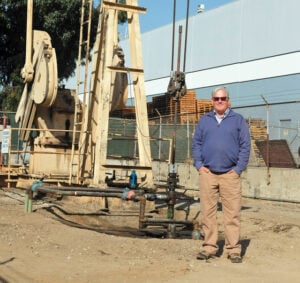The head of one of the state’s petroleum associations said that oil producers would likely “have to defend their rights in court” over an ordinance passed this month by the Los Angeles City Council banning new wells and phasing out existing ones.
Rock Zierman, chief executive of the California Independent Petroleum Association, a Sacramento trade group for the oil industry, said that “eliminating the ability of any property owner from operating their duly permitted assets without compensation is a clear violation of the United States Constitution’s Fifth Amendment protection against the illegal taking of private property, especially given the city’s reliance on false science.”
“It is highly likely companies will have to defend their rights in court,” Zierman added.
It is a sentiment agreed with by at least one oil company executive.
Todd Stevens, the chief executive of Black Knight Energy, a Valencia-based oil and gas producer and the former head of California Resources Corp., said that the move might be illegal.
The City Council on Dec. 2 voted 12-0 to ban all new oil and gas wells from being drilled in the city and to phase out over a 20-year period existing oil and gas wells. The vote comes after more than a decade of complaints from some city residents that pollution drifting from wells was affecting their health.
“Hundreds of thousands of Angelenos have had to raise their kids, go to work, prepare their meals (and) go to neighborhood parks in the shadows of oil and gas production,” said Los Angeles City Council president Paul Krekorian, one of the councilmembers who introduced this measure, the AP reported. “The time has come … when we end oil and gas production in the city of Los Angeles.”
The city is not the only local government to ban new oil and gas wells. Officials with Culver City have passed a similar prohibition, while the Los Angeles County Board of Supervisors passed a ban on all oil drilling, excluding the 1,000-acre Inglewood Oil Field southwest of downtown, according to a story by CoStar News. The bans in Culver City and the county also include a phaseout of existing wells.
The city of Los Angeles contains 26 oil and gas fields and more than 5,000 oil and gas wells that are active, idle or abandoned, according to city documents. These operations are located across the city, including Downtown, West Los Angeles, the San Fernando Valley and Wilmington, the CoStar News article said.
Jeff Cooper, vice president and co-owner of Cooper & Brain Inc., an oil and gas producer based in Wilmington, said that until the mayor signs the ordinance into law, the company will proceed as usual.
“Any business in the city of L.A. should be interested in this because if they do this to oil, what will be the next industry that they do this policy to?” Cooper said. “Otherwise, I stand by what the trade group says.”
‘Shutting you down’
In business since 1933, Cooper & Brain has 20 wells in the Wilmington Oil Field underneath the city of Los Angeles, an additional well in Signal Hill, and another 30 wells or so in northeastern Orange County.

That total well count produces about 260 barrels of oil a day, with about half that amount coming from the Los Angeles wells, Cooper said.
“All of a sudden, the city says you are no longer welcome here and we are shutting you down. It doesn’t seem fair,” he added.
Stevens, of Black Knight, agreed.
“I think it is poor policy when you consider the needs of the state, the city and the county for oil and natural gas,” Stevens said.
Whatever oil you don’t drill for locally will have to be shipped over from Saudi Arabia and other countries, Stevens said, adding that it was unfortunate and really bad policy.
“The council, even in a state where it’s one-party rule, is just pandering to the NGOs (nongovernment organizations) and the most progressive part of their party, as opposed to thinking of how the economy actually works and the needs of society for the byproducts and the petrochemicals and everything else that come from oil and natural gas, in addition to gasoline and diesel,” he said.
Constitutional issues
The municipalities imposing the bans are considering a new concept for these phaseouts: amortization. Under this plan – which is designed to circumvent a constitutional ban on the taking of private property without fair market compensation – a local government can move to declare an economic activity noncompliant with zoning codes and then require a company to stop that economic activity once it has recouped its investment. The government is not obligated to make any additional payment to the company.
This differs from eminent domain, wherein a property owner is compensated when a government entity takes their land.
“But under amortization you are not (compensated),” Brain said. “They’ve decided you have made enough profit. That seems like something that happens in other countries, not the United States.”
According to a fact sheet put out by the city on the ordinance, the 20-year amortization period is meant to give oil companies enough time to recoup their investments in drilling operations prior to being shut down.
Garcetti and the council have directed the city’s Office of Petroleum and Natural Gas Administration and Safety to prepare an amortization study, the fact sheet stated.
“Depending on the results of this study, there may be future code amendments requiring individual wells to shut down sooner, in instances when the operator may recoup their investments prior to the proposed 20-year amortization period as stipulated under this ordinance,” the fact sheet added.
Staff reporter Howard Fine contributed to this story.
